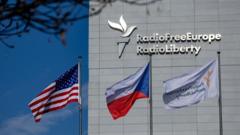Historically, RFE/RL has offered a lifeline of information to millions during the Cold War, promoting democratic values in regions where local media was tightly controlled and censored by communist authorities. However, with new cost-cutting measures introduced by Elon Musk during Trump's presidency, RFE/RL faced accusations of wasteful spending, provoking concerns about the consequences of a funding withdrawal.
RFE/RL's president, Stephen Capus, expressed alarm over the potential loss, calling it "a massive gift to America's enemies," noting that regional autocrats would benefit significantly from the broadcaster's demise. The Committee to Protect Journalists also weighed in, signaling that the funding cuts could jeopardize the safety of many journalists operating in authoritarian settings.
Currently, RFE/RL reaches an estimated 50 million listeners weekly across 23 countries, including key areas like Russia, Iran, and Afghanistan. Minister Lipavsky plans to engage with other EU foreign ministers, exploring ways to sustain the broadcast service's operations as U.S. federal support dwindles. This move by the Trump Administration marks a stark departure from the media policies of authoritarian governments in Russia, China, and Iran, which continue to invest heavily in state-sponsored media to combat Western liberal narratives.
As the situation escalates, the Czech Republic remains committed to finding solutions to keep RFE/RL on air, amidst widespread concerns for the future of independent journalism.
RFE/RL's president, Stephen Capus, expressed alarm over the potential loss, calling it "a massive gift to America's enemies," noting that regional autocrats would benefit significantly from the broadcaster's demise. The Committee to Protect Journalists also weighed in, signaling that the funding cuts could jeopardize the safety of many journalists operating in authoritarian settings.
Currently, RFE/RL reaches an estimated 50 million listeners weekly across 23 countries, including key areas like Russia, Iran, and Afghanistan. Minister Lipavsky plans to engage with other EU foreign ministers, exploring ways to sustain the broadcast service's operations as U.S. federal support dwindles. This move by the Trump Administration marks a stark departure from the media policies of authoritarian governments in Russia, China, and Iran, which continue to invest heavily in state-sponsored media to combat Western liberal narratives.
As the situation escalates, the Czech Republic remains committed to finding solutions to keep RFE/RL on air, amidst widespread concerns for the future of independent journalism.




















